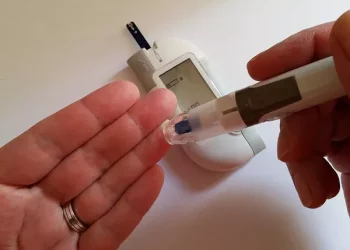A new study has revealed that a digital lifestyle modification program significantly reduces the risk of developing diabetes in prediabetic adults, offering a promising alternative to traditional treatments. The study, which involved over 130,000 adults, found that the program lowered the 10-year risk of diabetes by nearly 46% in prediabetic individuals and increased the rate of diabetes remission, all without the need for medication or extreme dietary restrictions.
Published in the journal Nutrients, the study evaluated the effectiveness of a digital intervention aimed at improving metabolic health and reducing diabetes risk. Researchers focused on a wide population that included individuals with prediabetes, diabetes, and those without any metabolic abnormalities. The digital program, which involved a 45-minute weekly session with a coach, emphasized dietary and behavioral changes to improve health outcomes.
Although the study was not a randomized trial and participation was voluntary, the findings highlight the potential of digital interventions in managing prediabetes and diabetes. Participants who engaged in the program showed notable improvements in key metabolic markers such as blood glucose levels, insulin resistance, and lipid profiles.
Study Details
The study tracked 133,764 adults, categorizing them into diabetic, prediabetic, and healthy groups based on fasting glucose and HbA1c levels. Over a 6 to 12-month period, the participants underwent blood tests to assess various metabolic markers, including insulin levels, glucose, and inflammation indicators like hs-CRP.
A portion of the participants—12.2% of prediabetic and 9.7% of diabetic individuals—volunteered for the digital lifestyle intervention, which focused on weight loss, physical activity, and healthier dietary habits. The program’s impact was measured using a diabetes risk model that predicted the likelihood of developing diabetes over the next 10 years.
Results and Findings
Participants in the lifestyle program saw a 45.6% reduction in their predicted risk of developing diabetes, compared to a mere 1.6% reduction in those who did not participate. Among diabetic individuals, the intervention led to a 2.4-fold increase in the remission rate, from 3.4% to 8.2%. Additionally, those in the lifestyle group experienced greater weight loss and improvements in metabolic markers like triglycerides, LDL cholesterol, and insulin sensitivity.
The study also found significant differences in metabolic health between the three groups. Diabetic and prediabetic individuals had higher insulin resistance, increased blood glucose levels, and elevated inflammatory markers compared to healthy individuals. In particular, insulin resistance was found to be a major contributor to early metabolic abnormalities, with a stark contrast between the prediabetic, diabetic, and healthy groups.
Implications and Future Research
This research underscores the importance of early intervention in high-risk individuals to prevent the onset of diabetes. The results suggest that lifestyle changes—especially those targeting insulin resistance—can have a profound impact on reducing diabetes risk and improving overall metabolic health.
While the study focused on a fully digital approach, the authors note that other evidence indicates blended programs, which combine digital and in-person interventions, may yield even better results. Further studies are needed to explore how inflammation and lipid abnormalities contribute to the progression of diabetes and cardiovascular disease, as well as to refine the most effective approaches for lifestyle modification in managing these conditions.
This large-scale study adds to the growing body of evidence that digital health interventions can be a powerful tool in combating chronic conditions like diabetes, offering a scalable solution to a growing global health challenge.
Related topics:
New Discovery Offers Hope for Diabetics: S100A9 Protein May Replace Insulin Therapy
Ultrasound Localization Microscopy as a Tool for Monitoring Type 2 Diabetes Progression
New Study Reveals Diabetes Rates in Australia May Be Significantly Underestimated

























